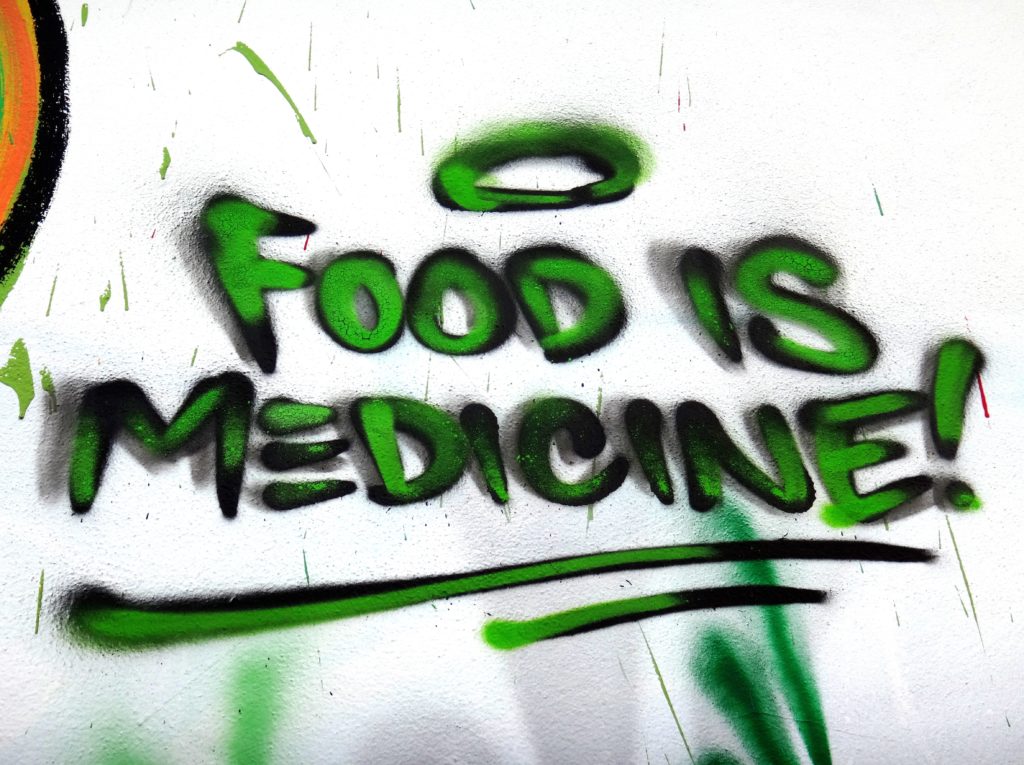
Guest Blogger: Julie Bomengen
Julie is a Vermont Licensed Clinical Mental Health Counselor (LCMHC) with 23 years of experience in the field of mental health. Julie is also a Nutritional Therapy Consultant (NTC), a certification of the Nutritional Therapy Association. She lives, works and plays in Lamoille County.
Around 400 BC, the Greek physician Hippocrates said, “Let food be thy medicine and medicine be thy food.” While this quote is commonly used in reference to physical health (think about doctors prescribing heart-healthy diets to reduce rates of heart disease), in today’s blog post we will be extending the tenet of “Food As Medicine” to mental health as well. Indeed, recent research confirms what Hippocrates said so long ago: nutrition is a key pillar for supporting positive mental health outcomes.
Simply put, our mood and food are intimately connected and bi-directional, each impacting the other. When we pay attention to the cues our bodies give us, we can often mitigate unwanted and unpleasant physical and emotional symptoms. For example, when I have clients tell me they are anxious, one of the first things I ask them about is their caffeine and sugar consumption. If you are experiencing a racing heart, pressured speech, or a cranked/on-edge nervous feeling, it may likely be that you have thrown your body chemistry out of balance by either over-consuming caffeine and/or eating too many-fast burning carbs which can lead to blood-sugar dysregulation or hypoglycemia, resulting in a yo-yo effect on your mood and energy levels. Perhaps an easy first step is to be curious about how you might feel differently if you were to reduce your caffeine use or eat a more nutrient-dense breakfast that stabilizes blood sugar levels and evens out your mood.
Did you know that our mental health is dependent on our body’s ability to make neurotransmitters, such as our “feel-good” chemicals, serotonin, dopamine, GABA, glutamate, and norepinephrine? Did you know that we need amino acids to make the neurotransmitters and that amino acids come from the proteins we consume? While the importance of eating good quality proteins cannot be overemphasized, it is equally as important that our bodies are digesting and breaking down these proteins into the amino acids that are the building blocks in the production of neurotransmitters. Approaching our consumption of food in a more intentional and slower manner and taking the time to awaken our senses as we eat is an important step in ensuring optimal digestion. With peak digestion comes prime production of the neurotransmitters that support positive mental health.
Lastly, there is growing research on the link between gut permeability (a.k.a. leaky gut), inflammation in the body and depression. Doing whatever you can to reduce inflammation by watching your stress levels and eating the types of foods that soothe and heal your intestinal lining helps support positive mental health outcomes (more on this in a later blog post).

Specific steps that can support positive mental health:
- Hydrate with water immediately upon waking. Drinking water supports cellular health and helps with mood, energy, mobility, and pain. Aim to consume 50% of your body weight in ounces of water every day. For example: If you weigh 150 pounds, shoot for 75 ounces of water per day. For every cup of caffeinated beverage you consume (these have a dehydrating effect on the body), compensate with an additional 2 cups of water.
- Eat food before consuming your coffee in order to mitigate the impact of the caffeine on your body’s nervous system.
- Choose longer-lasting sources of foods in the morning to prevent the mood swings and irritability often associated with eating sugary, processed foods. For example, make a simple breakfast sandwich with bacon (cook a few pounds of bacon over the weekend and store it in your freezer for easy use throughout the week) or sausage, eggs and greens, or make a breakfast bowl with rice, quinoa, scrambled eggs, greens, and cheese. This website offers multiple ideas on how to start your day with superfoods that support your physical and mental health.
- Eat your meals slowly, chewing each bite longer than you think you need to (or want to) to ensure the proper breakdown of nutrients in the body.
- Consider consulting with some of our local nutritionists or working with a health coach who can help you follow-through on meal planning and support the changes that can sometimes be difficult to make initially.
- Remember that even small changes will impact your mental health. Start to identify what foods make you feel poorly and what makes you feel best. Paying attention to how you feel helps. Keep a food/mood journal for 3-4 days, writing down everything you put into your mouth – solids and liquids. Notice your moods and digestive issues. Are you bloated and uncomfortable, is your heart racing, do you have energy, are you experiencing foggy brain, are you angry or irritable? Charting this information will help you remain objective and clear about what is and what is not supporting your mental and emotional health. Food is information, thereby, putting healthy ingredients into our bodies helps optimize both our physical and mental health and functioning.
- Understand that Excitotoxins – aspartame, sugars, artificial sweeteners – all have an impact on our focus, energy, and mood. Consider exchanging them for stevia, raw honey, or maple syrup. Similarly, eliminating additives and preservatives from foods will reduce their damaging impact on your mood.
- Eliminate harmful trans fats and oils, which lead to inflammation and oxidative stress in the body. As you work to decrease inflammatory processes by using healthy fats and oils like extra virgin olive oil, coconut oil, avocado oil, grass-fed butter, you will be supporting optimal mental health functioning and reducing the risk of depressive symptoms.
Additional Resources to Further your Education and Information:
https://www.psychologytoday.com/us/blog/evolutionary-psychiatry/201509/when-food-is-medicine
https://www.apa.org/monitor/2017/09/food-mental-health
Originally published June 4, 2019 on Live Well Lamoille.
